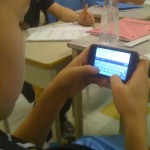 I’ve been thinking a lot lately about how Knowledge is changing in the digital age. With all the amazing resources, tools, connections, community information, mediums, people -it really all comes down to access, information and data. The World Wide Web has allowed us to access people, places and community – and how we are handling the abundant sources of information and data – which is changing how we are thinking and learning. I wonder how this is changing how we are learning literacy itself? Information is constantly being reconstructed and reshaped – in real time through combinations of mediums and perspectives and links and ideas. Our knowledge is being accessed, shared, given by anyone – adults to children and children to adults.
I’ve been thinking a lot lately about how Knowledge is changing in the digital age. With all the amazing resources, tools, connections, community information, mediums, people -it really all comes down to access, information and data. The World Wide Web has allowed us to access people, places and community – and how we are handling the abundant sources of information and data – which is changing how we are thinking and learning. I wonder how this is changing how we are learning literacy itself? Information is constantly being reconstructed and reshaped – in real time through combinations of mediums and perspectives and links and ideas. Our knowledge is being accessed, shared, given by anyone – adults to children and children to adults.
I was given a book to read by my thesis supervisor a couple of months ago and to be honest, I left it sitting on my desk because I wasn’t sure how relevant the information would be with a publishing date of 2003. But, I couldn’t resist to read a few chapters and ultimately got pulled all the way in.
Lankshear, C., & Knobel, M. (2003). New literacies: changing knowledge and classroom learning. Buckingham [England: Open University Press.
While these authors discuss a variety of perspectives, (historically and culturally) about the development of literacy in education, what resonated most for me is their discussion that “schools (today) operate on the belief that knowing, thinking, believing are located within the individual, and that knowledge is seen in the final analysis as a private possession and is examined, and accredited accordingly”. Here they ask, “Have schools operated to regulate scarcity of credentialed achievement – including allocations of literacy, ‘success’?”. It was this idea that began their critical reflection and journey of what literacy really is today. Does the demonstration of individual knowledge, on the spot, tell our true level of literacy for each individual? Is literacy for an individual carrying out on something that already exists? Today, knowledge and information are accessed, shared, discussed, reshaped, redesigned, edited, re-edited, co-edited and so on, in public spaces -in collaborative spaces – spaces where questions and inquiry are encouraged. Yet, even so, these authors remind us that “knowledge is seen in the final analysis as private”, based on a mindset that was developed long ago.
Eight years ago, even before Facebook and Twitter, these authors were questioning how we define knowledge and literacy in the digital age and how we are constructing and organizing our schools as a result.
I am left uneasy with the thought that still, even with all the research, books, articles, blogs, and discussions that tell us our society is now depending on a problem-solver generation that can work collaboratively and seek out ideas globally -is evaluated on individual performance and often without access to tools such as networks and people. Unless it is individually demonstrated, is it cheating? It really is in the mindset. When will the mindset change I wonder.
Thoughts?

